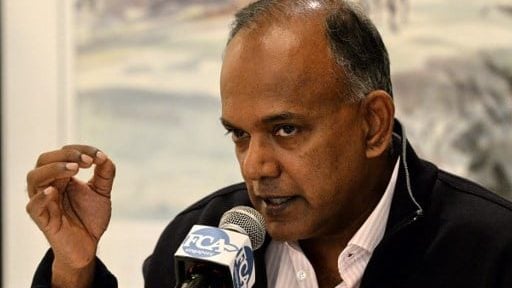Singapore – Law and Home Affairs Minister K Shanmugam provided his take on the ongoing protests in Hong Kong due to a controversial extradition Bill in an interview with South China Morning Post on August 11 (Sunday).
The Law and Home Affairs Minister began by addressing the several levels from which the recent events could be looked at – from a law and order situation and the public’s perspectives and expectations of the government.
“Airport sit-ins, weekly street protests for more than two months, then last week, of course, the police stations being surrounded, vandalized,” said Shanmugam concerning the incidents requiring law and order. “Any Government will have to deal with this law and order situation,” said the minister.
“At another level, when you see the extent of the protests, several thousands of people on the streets, and not just young people, but also people from different professions, civil servants, others,” Shanmugam said. He suggested that these underlying causes for the protests need to be dealt with as well.
Shanmugam mentioned some of the possible causes for the protests, such as the young population wanting their material aspirations to be met, from better housing and a better life to a different structure of government.
“Every Government has to deliver on these things.”
The minister noted that the government in Beijing, even the Hong Kong government, do deliver on these aspirations. However, better and more sustainable “solutions cannot be found if serious disruptions like these continue,” said Shanmugam.
For the ideological aspirations such as a change in government structure, Shanmugam expressed his worry for Hong Kong.
“Because there’s no easy way forward when people are in such entrenched positions,” he said.
“To go forward is going to need compromise and a clear approach that deals with the problem. Not just political, but also the social-economic problem.”
The minister noted that Hong Kong needs a supportive China to address these issues. Also, the solutions acquired need to work for both Hong Kong and China.
From an international perspective
Shanmugam also gave a global perspective, with outsiders looking in on the turn of events in Hong Kong.
“I think a confused, muddled picture has been presented because international news organisations have dealt with very superficial analysis, engaged in labelling.”
“All protesters are automatically, generally, democracy fighters. Police, on the other hand, are oppressive, attacking the forces of democracy, using excessive force.”
On the political issue, Shanmugam reiterated that Hong Kong is a part of China, which means Hong Kong is expected to adapt to China’s political structure.
While some protestors perceive that China will allow a different system in Hong Kong, Shanmugam called the expectation as “wishful thinking replacing reality.”
Singapore and Hong Kong’s greatest strength
SCMP mentioned that Hong Kong and Singapore are similar, wherein their most significant strength is the people plus the institution. Given this, the publication asked if the minister received more enquiries of people expressing their interest in moving assets to Singapore.
Shanmugam replied with, “I think at this stage, it is fair to say, Hong Kong has deep strengths. Hong Kong has very deep strengths.”
He added that Hong Kong’s financial system, stock exchange, a valuable position as an outpost for China, and its location are all incredible advantages that any investor will take into account and consider, and there is deep liquidity as well.
“These are not going to go away overnight.”
“There’s no profit in seeing instability. And if Hong Kong is at odds with China, it’s a problem for everyone, including us.”

